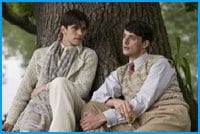It’s hard now todescribe the impact of Brideshead Revisited.
At a time (circa 1982) when the CBC was showing ghastly homophobic documentaries like Sharing the Secret and the US networks were still pussyfooting around gay characters (see Love, Sidney), the British produced this voluptuous 11- part miniseries version of Evelyn Waugh’s sumptuous 1945 novel that not only depicted a gay love affair but glamorized it to the hilt, with backdrops borrowed from Oxford, Venice and a country home so opulent it looked like a museum.
The first time I saw the series I ran out afterward and tried to find love.
This was long before gay marriage, remember — before Maurice, Another Country or even My Beautiful Launderette. Yet here it was, the great gay romance.
More than 25 years later it still hasn’t been bettered, certainly not by the new movie version with Matthew Goode and Ben Whishaw in the roles originated by Jeremy Irons and Anthony Andrews. With a quarter century of social progress under its belt the filmic version manages to say more but suggest less.
Both versions travel much the same ground: the distressingly bourgeois Charles Ryder falls for sweetly aristocratic Sebastian Flyte and is instantly swept into an opulent world of riverside picnics and country house weekends, though one complicated by Sebastian’s Catholicism, his controlling mother and his friend’s growing attraction to his sister, Julia.
Neither version features any gay sex and that bothers some people — are the lovers really gay? — but the series, unlike the movie, used that absence to erotic advantage.
The miniseries stayed very close to the novel, lifting huge hunks of dialogue and narration, but added a very explicit emotional subtext that explained everything. To see Jeremy Irons’ soft-eyed adoration was to know that if Sebastian was the more obviously out of the two, Charles was the more obviously in love.
True, there was one ambiguous scene, at the top of a staircase in a grand country house, when you expected something to happen, and instead they parted for the night, but knowing the ways of English country houses, one supposes that was just for appearance’s sake.
The movie on the other hand, makes it clear from the start the gay thing just isn’t on. It’s blunter about who’s gay and who’s not and it treats the gay love affair as little more than a preamble to the grand renunciation of the straight love affair that follows.
Right from the beginning Charles seems embedded in straight experience. The story is framed by glimpses of his very straight life, past, present and future, and when he meets Sebastian he is clearly amused but not in thrall. During the great Sauternes-and-strawberries scene by the river — a highlight of the TV series — their first kiss goes awry and somehow you’re not surprised. Right from the beginning of the scene, sitting beneath a shady tree by a tranquil river, they look more like models than intimates — extras, perhaps, from a Ralph Lauren ad. Whishaw is wearing a very smart jacket and scarf, tossed just so, but he and Goode appear to be acting in separate stories.
With his low brow and wide, voracious mouth, Whishaw is perhaps a better Sebastian than the slyly self-mocking Anthony Andrews. He has that rabbit-like vivacity that so many twinks affect. But he has no chemistry with Goode.
They take baths together, they swim in the nude together, but they send off no sparks together. Yet we’re supposed to believe that when Sebastian descends into self-destructive debauchery it’s because — warning, major plot point ahead — Charles has gone all straight and rejected him.
If this isn’t out and out homophobic, it’s certainly condescending. Maybe Sebastian was just enough of a hot-house flower to be done-in by a single love affair gone bad, but he also had a few problems with drinking, religion and a malevolent mommie. The series had the decency to leave all those options on the table. The movie whittles them down to one obvious answer, reducing the character in the process.
In a bid to streamline the story the movie’s writers have jettisoned a lot of what made it interesting. A lot of the minor comic characters enjoy less screen time and Anthony Blanche, the Oxford queen who’s a one-man gay community, is but a shadow of his former self. His great speech where he tells a bunch of loutish but “meaty boys” exactly what he wants from them is gone from the movie, as is the intimation that Blanche, too, may have had a thing for Charles.
Waugh’s story is as much about spiritual salvation as sexual release and much of his theology can seem morbidly masochistic, characters mortifying the flesh (metaphorically speaking) to prove their piety, but it emerges from a gay context and Waugh had the decency to give that world the full erotic glam, complete with several teasing insights into 1920s gay life at Oxford. But for that you’ll have to go back to the series, available on DVD.
The movie’s just not interested.

 Why you can trust Xtra
Why you can trust Xtra


